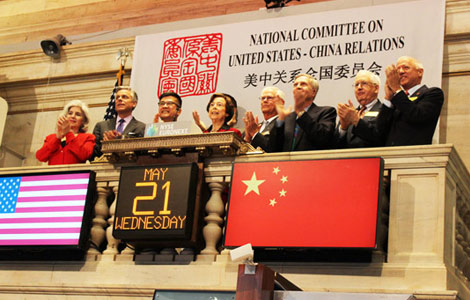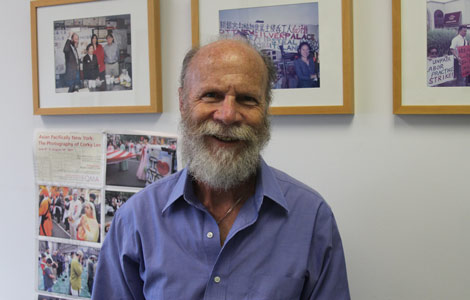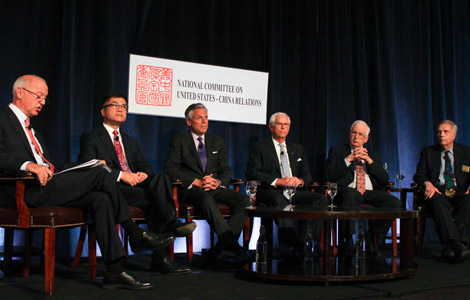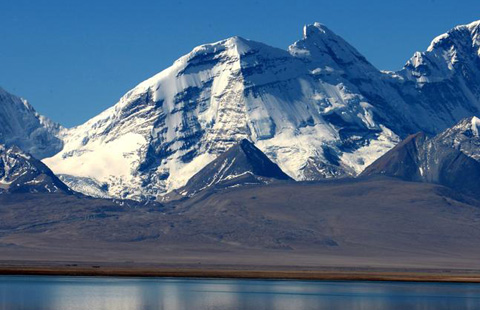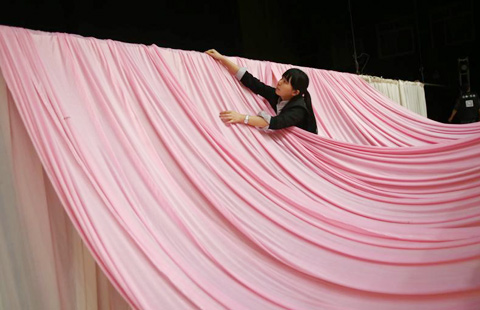The multibillion-dollar house that Jack built
Updated: 2014-05-25 23:22
By Meng Jing (China Daily)
|
||||||||
|
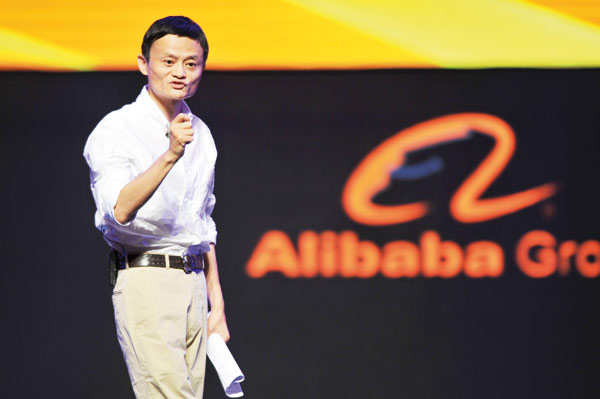 Jack Ma, founder and chairman of Alibaba Group. [Photo / Xinhua] |
The Chinese Internet tycoon Jack Ma once said he wants his self-made Alibaba Group Holding Ltd to last 102 years so the e-commerce company, founded in his apartment in Hangzhou, Zhejiang province, in 1999, will still be around in 2101, meaning it will have spanned three centuries.
It is way too early to predict whether Ma's wish will come true, but at least one thing is not in doubt: Alibaba is a fabulously successful company, and as its 15th birthday nears, it finds itself in possession of more than 90 percent of China's online retail market. Recently it filed for what may become one of the largest initial public offerings in the United States.
"We are a very lucky company," Ma has often said. A large part of that luck, he says, boils down to the fact that it is a product of the Internet age, and that he has been on hand to make the most of that.
"In the industrial age, you needed to have a rich father to be successful," he says.
Not only did Ma not have a rich father, there is nothing in his family background giving the barest hint of the financial success that would one day be his. The 49-year-old got poor grades when he was in school. English was the only subject in which he excelled, and he was an English teacher until he happened upon the Internet industry on a trip to the United States as an interpreter in 1994.
Ma's excellent English appears to have been pivotal when he gave a six-minute presentation in 2000 that landed him a $20 million investment from SoftBank Corp of Japan.
After some web-based business attempts, he teamed up with 17 co-founders to build Alibaba in 1999 with a mission to make it easy for small and medium enterprises to "do business anywhere".
Alibaba, which started as a business-to-business online platform to bridge the information gap between Chinese suppliers and international buyers, has grown into a huge e-commerce conglomerate. It functions like a combination of Amazon, eBay and PayPal.
Chinese online shoppers bought merchandise worth 1.542 trillion yuan ($248 billion) on Alibaba's online marketplaces, Taobao Marketplace, Tmall and Juhuasuan, last year.
Those online marketplaces accounted for 85.67 percent of China's total online shopping market and for about 6.5 percent of China's total retail sales.
Tian Hou, chief analyst with T. H. Capital LLC, a research and investment adviser in Beijing, who has followed the development of Alibaba for more than a decade, says that unlike Bill Gates, whose background was technical, and who knew how to take his company's products to the next level, the way Jack Ma builds Alibaba is based purely on his vision.
"Ma has built an entire virtual society, based on the e-commerce economy. There have been no benchmarks or guidelines for him to do this; all he has had to rely on is vision."
Alibaba's looming IPO has raised the company's profile among Wall Street investors, she says.
"For them, Alibaba is not just a leading e-commerce company in China anymore. The IPO is going to help it become one of the top companies in the world."
Alibaba's regulatory filing to the US Securities Exchange Commission gave a $1 billion placeholder value for the offering, but the real amount is expected to be far higher, possibly exceeding $20 billion, topping a $19.65 billion offering by Visa Inc in 2008, according to data compiled by Bloomberg.
Alibaba has not specified how many shares it will offer, their price, or a proposed IPO date, and it has not revealed whether it will be on the New York Stock Exchange or Nasdaq.
But analysts say the IPO is likely to value Alibaba between $150 billion and $250 billion, which means it would be valued as low as the social media site Facebook or as high as the global retail giant Wal-Mart.
Porter Erisman, who worked as a vice-president at Alibaba.com and Alibaba Group between 2000 and 2008, says that when he first joined the company there was little hint that Alibaba would become as successful as it has.
"When I joined Alibaba back in 2000, Ma and his team had just moved out of the apartment. I was attracted by the unique dream the team had to build a global Internet company from China."
It seemed like a unique challenge, "and I couldn't resist being a part of it", says Erisman, who later turned his experience at Alibaba into an award-winning documentary, Crocodile in the Yangtze.
Erisman, who at various times led the company's international website operations, international marketing and corporate affairs, says Alibaba was not a team of all-stars.
"But Jack's great talent is in bringing together ordinary people to achieve extraordinary things. So in many ways he was more like a coach than a traditional boss.
"He always has high expectations of his team. And, like a good coach, he lets you know it when he is unhappy with your results, because he always expects 100 percent effort. Rather than having employees try to please him as a boss, he aligns the staff to chase a more important goal, such as building a platform which creates millions of jobs," he says, adding that when he left Alibaba in 2008, he felt that it was on its way to becoming a world-class company because it had survived some of the Internet's leaner times and survived a big battle with the e-commerce giant eBay.
Like e-Bay, Alibaba's platforms, for a long time, were free to customers. As a start-up company at the time, it needed to find investors.
So Ma brought in investment from SoftBank Corp in 2000 and Yahoo in 2005. In the following years Alibaba and Yahoo had rows that were eventually patched up.
Alibaba's strong business performance has become a key driver for Yahoo's share price. The $20 million that the SoftBank founder Masayoshi Son invested in Alibaba in 2000 is expected to make him one of the richest people in the world as SoftBank is Alibaba's largest shareholder with a 34.4 percent stake.
With the huge pile of money Alibaba is expected to raise from the IPO, the top question for Jack Ma is what is next for Alibaba. Michael Clendenin, managing director of RedTech Advisors LLC, a Shanghai-based IT consultancy, says Alibaba's IPO is unusual.
Jack Ma stepped down as chief executive officer in May last year, saying he was no longer young enough to run an Internet business, but he still serves as chairman of the board.
He is reported to write e-mails to Alibaba staff to encourage them in their work. In the first four months of this year, Alibaba Group and Ma invested a combined 37 billion yuan in various companies ranging from traditional media and video to department store operator, becoming one of the most aggressive investors among China's big three Internet giants, the other two being Tencent Holdings Ltd and Baidu Inc.
Vanessa Zeng, an analyst with Forrester Research in Beijing, says: "With frequent investments, such as its acquisition of AutoNavi and its strategic investment on Intime Retail Group Co and online video site Youku Tudou Inc, Alibaba has been trying to build a complete ecosystem that can compete with these competitors. "The challenge will lie in effectively integrating the properties it has newly acquired and invested in," Zeng says.
Ma has said in an intra-company email that Alibaba faces "unparalleled challenges and pressures" in the US IPO because of the scale, expectations, cultural clash and consciousness of national boundaries, geopolitics and economics.
Going public is not an end in itself, he says, but a way of ensuring the company keeps on advancing.

 37,000 US flags planted in Boston for Memorial Day
37,000 US flags planted in Boston for Memorial Day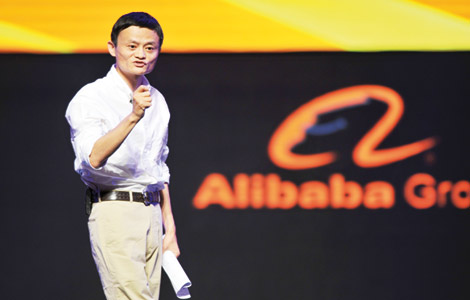
 The multibillion-dollar house that Jack built
The multibillion-dollar house that Jack built
 Highlights of New York Forum Africa
Highlights of New York Forum Africa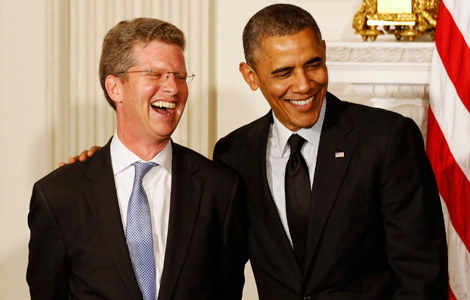
 Obama picks Director of OMB, new Secretary of HUD
Obama picks Director of OMB, new Secretary of HUD
 In photos: aftermath of Santa Barbara campus shooting
In photos: aftermath of Santa Barbara campus shooting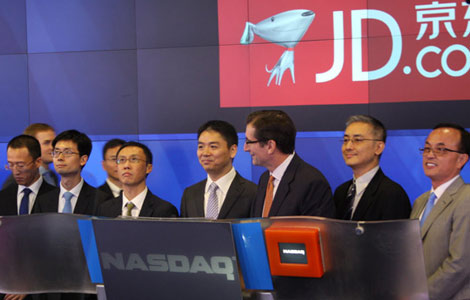
 JD.com makes US debut with $1.78b IPO
JD.com makes US debut with $1.78b IPO
 Lucy Li, at age 11, makes US golf history
Lucy Li, at age 11, makes US golf history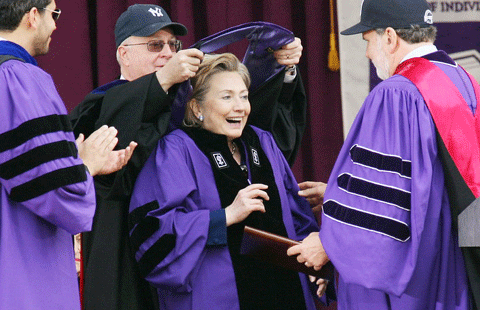
 World leaders wear gowns to collect certificates
World leaders wear gowns to collect certificates
Most Viewed
Editor's Picks
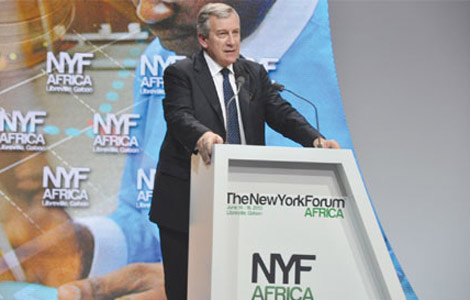
|

|

|

|

|

|
Today's Top News
Obama pledges to uphold 'sacred trust' with veterans
22 dead, 7 missing in south China rainstorms
7 dead in drive-by shooting in California
US cyber-scoundrelism to backfire
Van Gogh, Monet works going to US gallery
Republicans try to define Clinton
Checks to help ensure cybersecurity
Opinion: The pot calls the kettle black
US Weekly

|

|
